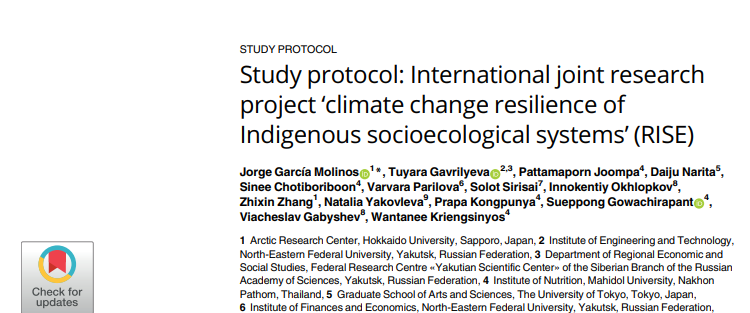Study protocol: International joint research project ‘climate change resilience of Indigenous socioecological systems’ (RISE)
Journal /Conference
PLoS ONE
Authors
Molinos, Jorge García(a); Gavrilyeva, Tuyara(b), (c); Joompa, Pattamaporn(d); Narita, Daiju(e); Chotiboriboon, Sinee(d); Parilova, Varvara(f); Sirisai, Solot(g); Okhlopkov, Innokentiy(h); Zhang, Zhixin(a); Yakovleva, Natalia(i); Kongpunya, Prapa(d); Gowachirapant, Sueppong(d)
Affiliation
(a) Arctic Research Center, Hokkaido University, Sapporo, Japan
(b) Institute of Engineering and Technology, North-Eastern Federal University, Yakutsk, Russian Federation
(c) Department of Regional Economic and Social Studies, Federal Research Centre «Yakutian Scientific Center» of the Siberian Branch of the Russian Academy of Sciences, Yakutsk, Russian Federation
(d) Institute of Nutrition, Mahidol University, Nakhon Pathom, Thailand
(e) Graduate School of Arts and Sciences, The University of Tokyo, Tokyo, Japan
(f) Institute of Finances and Economics, North-Eastern Federal University, Yakutsk, Russian Federation
(g) Emeritus Researcher Faculty of Liberal Arts, Mahidol University, Nakhon Pathom, Thailand
(h) Institute for Biological Problems of Cryolithozone of Siberian Branch of the Russian Academy of Sciences, Yakutsk, Russian Federation
(i) KEDGE Business School, Paris, France
Abstract
Background Anthropogenic changes in the environment are increasingly threatening the sustainability of socioecological systems on a global scale. As stewards of the natural capital of over a quarter of the world’s surface area, Indigenous Peoples (IPs), are at the frontline of these changes. Indigenous socioecological systems (ISES) are particularly exposed and sensitive to exogenous changes because of the intimate bounds of IPs with nature. Traditional food systems (TFS) represent one of the most prominent components of ISES, providing not only diverse and nutritious food but also critical socioeconomic, cultural, and spiritual assets. However, a proper understanding of how future climate change may compromise TFS through alterations of related human-nature interactions is still lacking. Climate change resilience of indigenous socioecological systems (RISE) is a new joint international project that aims to fill this gap in knowledge. Methods and design RISE will use a comparative case study approach coupling on-site socioeconomic, nutritional, and ecological surveys of the target ISES of Sakha (Republic of Sakha, Russian Federation) and Karen (Kanchanaburi, Thailand) people with statistical models projecting future changes in the distribution and composition of traditional food species under contrasting climate change scenarios. The results presented as alternative narratives of future climate change impacts on TFS will be integrated into a risk assessment framework to explore potential vulnerabilities of ISES operating through altered TFS, and possible adaptation options through stakeholder consultation so that lessons learned can be applied in practice. Discussion By undertaking a comprehensive analysis of the socioeconomic and nutritional contributions of TFS toward the sustainability of ISES and projecting future changes under alternative climate change scenarios, RISE is strategically designed to deliver novel and robust science that will contribute towards the integration of Indigenous issues within climate change and sustainable agendas while generating a forum for discussion among Indigenous communities and relevant stakeholders. Its goal is to promote positive co-management and regional development through sustainability and climate change adaptation. © 2022 García Molinos et al. This is an open access article distributed under the terms of the Creative Commons Attribution License, which permits unrestricted use, distribution, and reproduction in any medium, provided the original author and source are credited.
DOI / Link
10.1371/journal.pone.0271792


